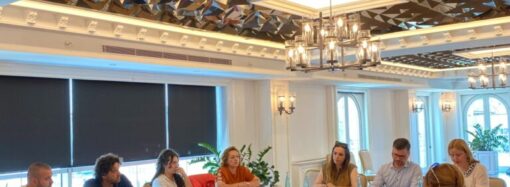On November 22, EMA in cooperation with the Slovak Foreign Policy Association, with the contribution of the Albanian Agribusiness Council (KASH) and with the financial support of Slovak Aid held in Vlora the third session of Working Group III. This activity was organized within the framework of NCEI 2021- 2023 and was focused on the models of socio-economic development for rural areas (Pilot project “The Ecological Oasis of Butrinti”) and the use of pesticides in organic farming.
Arian Japullari, Vice Minister of Agriculture and Rural Development stated that the ministry supports all forms of cooperation and capacity increases in the rural development sector. He praised the approximation of the legislation with the EU Acquis and added that the best farm models throughout Albania are being identified to benefit from financial support schemes, such as AZHBR and IPARDIII funds that begin in January 2023.
Ervis Moka, Chairman of the Vlora District Council said that the council is ready to cooperate with various actors in the function of European integration, noting the importance of increasing the exchange of experiences with Slovakia and similar countries.
Aulona Beqiri Veizi, Deputy Mayor of Vlora emphasized that in this region there is a predominance of viticulture and a greater degree of certification for organic products is needed. Veizi pointed out that the pilot project “Ecological Oasis of Butrint” has interesting objectives and should be implemented in Vlora as well. Later on, she presented a report with data regarding the ratio of land for fruit growing and arable land in the territory of the Vlora Municipality, where the latter was relatively larger. Veizi added that olive trees predominate with 79%, followed by vineyards with 17%, fruit trees with 3%, etc.
Agim Rrapaj, Chairman of the Council of Albanian Agribusiness (KASH) explained the steps for the implementation of the pilot project starting from co-operation and coordination; innovation and digitalization; financing as well as improving legislation and approximating with the Acquis of the EU. He noted the fact that this initiative will contribute to the development of various forms of tourism and will serve as a new socio-economic development model for rural areas. The implementation of this project requires commitment from state, non-state structures as well as the university to ensure as high efficiency as possible with field experts.
Slovak expert Ján Baršváry brought Slovakia’s case closer in terms of rural development and explained the use of pesticides in organic agriculture based on EU regulation and changes that are expected to occur by providing recommendations for the strategy being drafted in Albania. He listed some of the main objectives in the regulations such as: the mass reduction in the use of chemical pesticides by about 50% and the finding of replacement alternatives, decrease by more than 50% of use for environmentally harmful pesticides, improvement of data coming from surveys on pesticide application, encouragement on using new technologies to reduce the risk of fertilizers as much as possible, as well as around 25% of the total agricultural land to be transformed into organic farming. On the other hand, the expert noted the importance of increasing state support for farmers in Albania. The budget must be increased and bureaucratic barriers should be eased in order for everyone to benefit. These funds would then help to apply a new technology to agriculture and ensure the finding of alternative forms for pesticides, thus reducing to a considerable extent their negative impact on the environment.




















